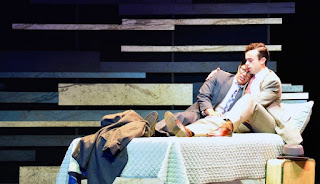 |
| The Latchis marquee also advertised films in two of the theaters - "Emily" and "Beast." |
 |
| The cast of Die Walküre (including the Valkyries) takes a bow at the Latchis Theater. |
 |
| Jenna Rae |
 |
| The Latchis marquee also advertised films in two of the theaters - "Emily" and "Beast." |
 |
| The cast of Die Walküre (including the Valkyries) takes a bow at the Latchis Theater. |
 |
| Jenna Rae |
"Fellow Travelers," a story set in the 1950s era of political paranoia dominated by U.S. Sen. Joseph McCarthy, is the contemporary work in this year's Seagle Festival opera program in the Adirondack mountain town of Schroon Lake, N.Y.
A work with a tender heart by composer Gregory Spears and librettist Greg Pierce, "Fellow Travelers" is based on the novel by Thomas Malton, which traces the doomed love affair of Timothy Laughlin and Hawkins Fuller, federal government employees.McCarthy's zeal to root out supposed Communists in the State Department and the U.S. Army also included homosexuals who, the theory went, were security risks as they could be blackmailed by a foreign agent who might threaten to reveal their sexual orientation.
McCarthy (R-Wis.) exploited genuine concern about the rise of the Soviet Union, the Iron Curtain of repression across Eastern Europe, China's conversion to Communism and the conviction and execution of the Rosenbergs for passing classified nuclear weapons information to the Soviet Union.
Throughout the mid-50s, he and his lawyer ally, Roy Cohn, led or influenced campaigns of persecution, accusing people in government, academia, Hollywood and the military of being Communists, Soviet spies or sympathizers, i.e., "fellow travelers."
 |
| Daniel Esteban Lugo and Joel Clemens in "Fellow Travelers." Photo/Seagle Festival |
In a pre-show lecture, Seagle Artistic Director Darren K. Woods noted that Dupont Circle was a noted gay cruising area. As homosexual acts were illegal in many states, men often met clandestinely in public places, but were also vulnerable to arrest by undercover police.
Laughlin, played with shy sweetness by Daniel Esteban Lugo, is drinking milk with his lunch, prompting the self-assured Fuller, known as Hawk, playfully to dub him "Skippy." Fuller, smoothly played by Joel Clemens, recommends Laughlin for a speechwriting job in the office of Sen. Potter, Laughlin sends him a thank-you gift and Fuller drops by Laughlin's apartment.
 |
| Daniel Esteban Lugo and Joel Clemens in "Fellow Travelers." Photo/Seagle Festival |
Spears has written music that brilliantly matches these vocal parts and characterizations, brought to life by Lugo's supple tenor and Clemens' thrilling baritone. They have a lovely duet, relaxing in Laughlin's apartment, just two men on a bed, singing about placing "my head on your arm."
After their sensual encounter, Laughlin has a slight problem - he's a devout Catholic, a denomination that to this day considers homosexuality "disordered." In a wonderful aria, he begins with "Forgive me, Holy Father, I confess," but ends with "Thank you, Holy Father, for sending him to me." Is there a more poignantly conflicted expression of love and faith, expressed without rancor?
 |
| From left, Daniel Esteban Lugo, Emily Finke, Joel Clemens and Shannon Richards in "Fellow Travelers." Photo/Seagle Festival |
Fuller doesn't even want to, proposing a threesome to the shocked Laughlin, then telling him he's not the monogamous type.
In this shadow world, women play particularly fraught roles. Hawkins' assistant Mary Johnson is attracted to him, but accepts reality. In another gorgeous aria, Shannon Richards' glowing soprano expresses Mary's concern ("I worry") about the fates of the two men.
In a plot turn that seems to be dropped in from nowhere but has obvious ramifications to today's news, Johnson reveals she is pregnant from a one-night stand but "knows a doctor in New Orleans" who "takes care" of such things.
When Laughlin, attempting to escape his anguished relationship, enlists in the Army, Hawkins marries another office worker, Lucy (Emily Finke), and tries to take up the life of a good suburban heterosexual husband. It was, and is, an all-too-common sham that devastated both men and women.
In the last few scenes, the story leans toward soap opera and seems to meander to its inevitable heartbroken farewell, but does reflect the ambivalence of each man's tie to their relationship.
In his lecture, Woods said that composer Spears' inspirations are George Frederic Handel and Philip Glass -- 18th century Baroque and modern minimalism. Glass' typical repetitive musical phrases and Handel's graceful embellishments give Spears' music a shimmering beauty and endless interest. Seagle's cast of "fellow travellers" and the dual pianists, Music Director Neill Campbell and Assistant Music Director Lindsay Woodward, made the most of it.
Under the overall stage direction of Richard Kagey, Evan Johnson's spare set design perfectly melded with Liza Schweitzer's lighting design.
"Fellow Travelers," was co-commissioned by G. Sterling Zinsmeyer and Cincinnati Opera, premiered in 2016 and has had nine productions by major opera companies. It deserves many more.